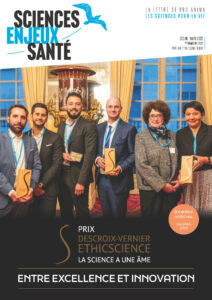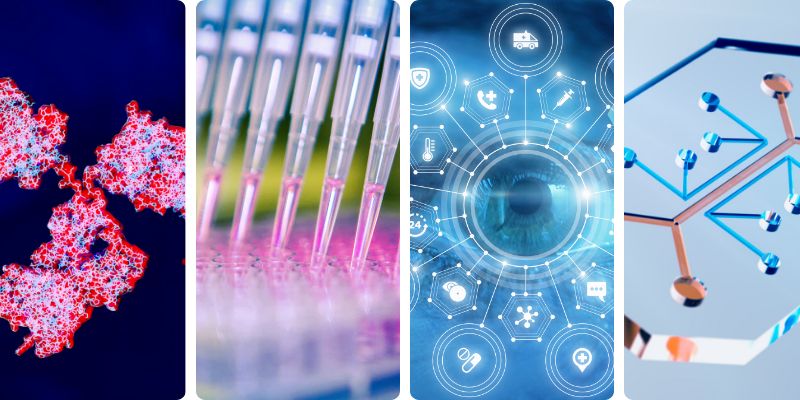
Human-based tech in India, Prof Ingber’s Interview, Living heart tissue drive RNA research
News on non-animal methods
APRIL 8 - 12, 2024NEWS, REPORTS & POSITION STATEMENTS
1. Horizon Europe strategic plan (2025 – 2027): an attention to One Health concept and the widening participation in the ERA
Highlighting the Widening Participation and Strengthening the European Research Area (WIDERA) as a key aspect to narrow the innovation gap between countries, and promote excellence, competitiveness and innovation across the European Research Area (ERA), the plan presented six clusters. Cluster 1, dedicated to Health, will pursue efforts to better understand and mitigate the effects of the triple planetary crisis (climate change, pollution and biodiversity loss) on human health and healthcare systems, as per the One Health concept.
Among the purposes of Cluster 1, the plan indicates that non-animal new approach methodologies hold great promise to replace or complement animal studies for improving biomedical research, safety assessment of chemicals, or testing of therapies. Cluster 1 will continue its support to the development and validation of alternatives to animal testing.
2. Opinion piece by ECHA Director of Prioritisation and Integration
Ahead of the EPAA poster exhibition at the Helsinki Chemicals Forum 2024, in collaboration with Euractiv, European Chemicals Agency Director of Prioritisation and Integration
Ofelia Bercaru shared her view and confirmed that, in ensuring chemical safety, the shift towards alternative test methods is already underway. Under the EU’s chemicals legislation, alternative methods are widely used, for example, to test whether chemicals irritate eyes or skin.
Where alternative methods to assess the chemicals’ hazards do not exist, animal tests may still be needed as a last resort. This is the case for more complex hazards, like carcinogenicity or reproductive toxicity. However, interesting research is already on-going and good progress is seen in many areas. Science is progressing.
3. Human-based tech : reglementation and training in India
The Indian Institution’s support to human-based technologies
Countries around the world are committing to move toward more relevant technologies to mimic the complexities of human biology, and India has made a good start, with policy and regulatory decisions incentivising this field.
In 2019, the Indian Council of Medical Research (ICMR) produced a roadmap to support human-based technologies in experimentation and drug development. The white paper proposed several recommendations, including establishing ‘Centers of Excellence’ to develop this interdisciplinary field. The Department of Biotechnology (DBT) also released a funding call in 2023 to support the development of more relevant models for screening new drugs. In addition, the Ministry of Health and Family Welfare produced an amendment to the New Drugs and Clinical Trials Rules (2019) in 2022.
How India is training next-generation human-centric scientists
For Umar Sheikh, a PhD student at the All India Institute of Medical Sciences (AIIMS) in New Delhi, to utilise cutting-edge technologies to develop novel cancer therapies, he would require not only the infrastructure to conduct experiments but also the guidance of a resourceful network of fellow scientists working on similar models throughout the country.
In an effort to document the growing community of human-relevant researchers, Centre for Predictive Human Model Systems (CPHMS) has curated a database of Indian scientists working in the fields of organoids, organ-on-chips and computational modeling. The open-access database enables students and scientists to access experts working in the field and also serves as a critical resource for public, private investors as well as policymakers.
4. Revolutionizing developmental neurotoxicity testing – a journey from animal models to advanced in vitro systems
Over two decades, cutting-edge science enabled the design of a testing approach that spares animals and enables throughput for this challenging hazard. While it is evident that the field needs guidance and regulation, the massive economic impact of decreased human cognitive capacity caused by chemical exposure should be prioritized more highly.
Comprehensive advanced non-animal testing strategies like in vitro developmental neurotoxicity (DNT) testing can now replace animal-based approaches to assess more accurately and efficiently the complex hazard of exposure to chemicals to the human brain. Recent OECD test guidance has formalized this battery of in vitro test methods for DNT, marking a pivotal achievement in the field. “The combination of these disruptive technologies will lead us to far more than just replacing animal tests. We can do things we did not dream of when we started this 20 years ago. The challenge now is implementation !” - Smirnova et al.
5. The (misleading) role of animal models in drug development, by Prof Hartung, John Hopkins University
Animals like mice and rats have long been used in medical research to help understand disease and test potential new treatments before human trials. However, while animal studies have contributed to important advances, too much reliance on animal models can also mislead drug development. This article explains for a general audience how animal research is used to develop new medicines, its benefits and limitations, and how more accurate and humane techniques — alternatives to animal testing — could improve this process.
6. Confronting the bias towards animal experimentation (animal methods bias)
NAMs approaches that use human biology, cells, and data to mimic complex human physiological states and therapeutic responses have become increasingly effective and accessible. Despite many advantages, acceptance of NAMs has been slow, and barriers to their broader uptake remain.
One such barrier is animal methods bias, the preference for animal-based methods where they are not necessary or where animal-free methods are suitable. This bias can impact research assessments and can discourage researchers from using novel nonanimal approaches. This article provides an introductory overview of animal methods bias for the general public, reviewing evidence, exploring consequences, and discussing ongoing mitigation efforts aimed at reducing barriers in the shift away from animal use in biomedical research and testing.
INTERVIEWS, NOMINATIONS, AWARDS
7. Disrupting drug discovery and testing with human Organs-on-Chips with Prof Donald Ingber, Wyss Institute, Harvard
Transcribing a one-hour discussion, the interview gives an overview of Professor Ingber’s career, enabling to learn more about the creation of the Wyss Institute of which he is at the origin, and of the organ-on-chip (OoC) technology, as well as the reasons that make this technology a “revolutionary approach to better understand human diseases and assess drug toxicity.”
Among the highlights of the interview, Prof. Ingber discussed the success of Emulate’s Liver-chips in predicting drug-induced liver injury, bone marrow chips and their potential to assess drug side effects and contribute to personalized medicine. The researcher also highlighted the need for robust alternative methods and the necessity to harmonize globally the quality of qualification of techniques and validation of criteria. He also mentioned the current obstacles to the acceptance of these new methods and social barriers, notably in regulatory toxicology. The interview reflects both the positive and constructive vision of the researcher, and his enthusiasm regarding the evolution of biomedical research and the potential of OoC technology.
INDUSTRY, BIOTECH & PARTNERSHIPS
8. O&OoC in France : sector structuration led by BioValley France and France Biotech
BioValley France, leader in the O&OoC sector and representative of Enosis Santé, represented by Jean-Dominique Guitton, and France Biotech, represented by Thibault Honegger, co-founder and CEO of NETRI, an organ-on-a-chip industrial start-up, are joining forces to manage the work of the Strategic Sector Contract relating to organoids and organs on a chip (O&OoC) in France over the period 2023 – 2026.
This group was created with the ambition to make proposals in favor of both technological and regulatory transition in order to build an environment for the development and reception of new projects, and with the aim of creating a collective force and propose concrete actions to animate and highlight the interest in structuring the O&OoC sector.
Read the release (FR)
SCIENTIFIC DISCOVERIES & PROTOCOLS
9. Cancer-on-a-chip model shows that the adenomatous polyposis coli mutation impairs T cell engagement and killing of cancer spheroids
Researchers from the Institut Pasteur used a cancer-on-a-chip to track the motion of individual T cells as they attack cancer spheroids within microfluidic hydrogel droplets.
With this cancer-on-a-chip platform, they were able to evaluate the impact of adenomatous polyposis coli (APC) mutation on cytotoxic T Lymphocytes (CTL) migration and cytotoxicity against 3D tumor spheroids.
10. Living heart muscle slices drive RNA research into heart failure
Professor Thomas Thum, Head of the Institute of Molecular and Translational Therapy Strategies at Hannover Medical School (MHH), has been researching MicroRNAs (miRNAs) for years. In their new study, he and his team have now demonstrated the effect of inhibiting miR-21 in human heart tissue for the first time. They used a method involving living myocardial slices (LMS).
“To our knowledge, this is the first study in which the effects of miR-21 have been investigated directly on living human heart tissue,” says Professor Thum. The LMS model has proven its worth in providing preclinical proof of efficacy and should also contribute to a significant reduction in animal testing in the future.”
Read the publication in Oxford Academic / European Heart Journal
UPCOMING WEBINARS, WORKSHOPS, SYMPOSIA
Online event, April, 17 : Remembering Marty Stephens and his contributions to humane science.


